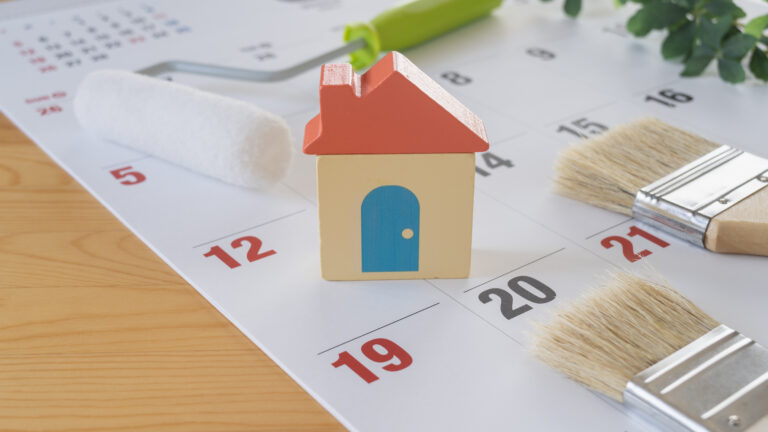Winter Home Maintenance Checklist
TABLE OF CONTENTS:
- Avoid Ice Dams
- Weatherproof Exterior Pipes
- Remove Window Screens
- Keep Snow Away from Major Home Utilities and External Vent Pipes
- Winter HVAC Maintenance
- Bleed Your Radiators
- Winterize Your Entryway
- Clean Your Dryer Vents
- Maintain Healthy Humidity Levels
Whether we are fans of the snowfall and subzero temperatures that winter brings along with it or not — it’s here! As a homeowner, it’s important to stay on top of property maintenance and general maintenance both inside and outside of your home throughout the winter months.
Where to start can feel overwhelming sometimes, though. If you’re looking for some winter maintenance tips to follow, be sure to check out IKO’s winter maintenance checklist below to ensure your home is well cared for throughout the winter season.
Outdoor Winter Property Maintenance Tips
Once the snow flies, it may seem like there’s not much to do outdoors, but we beg to differ! Here are some exterior home maintenance tips to keep in mind this winter.
Avoid Ice Dams
Icicles hanging from your eaves may give off a bit of a winter wonderland feeling, but they indicate a relatively serious problem: ice dams. An ice dam is a thick ridge of solid ice that can develop along the edge of your roof near your eaves.
Preventing and removing ice dams is the most important winter roof maintenance tip we can offer both new and existing homeowners. We recommend staying on top of ice dams as part of your winter maintenance checklist because they can cause significant damage if left unchecked.
Ice dams can loosen shingles, wreak havoc on your gutter system and even cause water to back up through your roof shingles into your attic. As a result, you may end up with soggy insulation (a breeding ground for mold) and sagging ceilings.
Ice dams can also cause water to back up into your home, which can cause damage to insulation, and walls, and even make its way into your basement where it could damage your home’s foundation.
Weatherproof Exterior Pipes
In terms of exterior pipes that service outdoor areas, simply have the water blown out and valves shut prior to extended frost. But, when exposed exterior pipes need to be used all year long, it is important to insulate them. Otherwise, the water can freeze, expand, and result in a burst pipe. Which, in turn, can cause flooding in your home and on your property.
This is a home maintenance tip that you will want to tend to early in the winter. Be sure to insulate not only outdoor pipes, but any exposed pipes indoors that are located in an unheated space. This might include pipes near exterior walls and pipes in your garage, basement or attic.
You can insulate exterior pipes fairly easily on your own with foam pipe sleeves (which you can get at your local hardware store. They typically come in 6-foot lengths and varying diameters for different pipe sizes. You simply open the slit in the sleeve to cover the pipe with it and then seal the seam with duct tape.
With that said, if you need to insulate any interior pipes near exterior walls, you may want to hire a professional contractor.
Remove Window Screens
The benefits of removing your window screens in the winter are twofold: it may help to lower your energy bills and protect your windows from winter storms.
Removing your window screens as part of your winter maintenance checklist will allow more solar heat into your home during those cold months, which helps to offset your heating bills.
As mentioned above, removing window screens as part of your winter maintenance checklist also helps protect your windows and the screens themselves. Alternatively, snow and ice can get caught between your screen and your window which can lead to rotting window frames or sills. It can also damage the screen itself since they are not built to support the weight of heavy snow or ice.
Keep Snow Away from Major Home Utilities and External Vent Pipes
Aside from the general home maintenance that all residents of colder climates are accustomed to (shoveling and/or running their snowblower regularly), IKO suggests keeping snow away from the major exterior utilities of your home, like your gas meter, as an important home maintenance tip.
Avoid using your snowblower or a plow near your gas meter and never let significant amounts of snow or ice accumulate on the meter itself. Doing so will place undue stress on your meter pipes, which can potentially lead to a gas leak.
Every gas meter also has a pressure relief vent, which should be kept clear of snow to operate sufficiently. Keeping a pathway shoveled to your gas meter will also ensure that your utility company can access it in the case of an emergency.
Place a cover on top of your air conditioning unit and keep the snow shoveled away from its perimeter to help keep it protected from any damage, like falling tree limbs or icicles. With that said, boxing it in completely is not advisable as it will become a welcome haven for rodents and may result in mold or mildew.
In addition to including your gas meter and central air conditioner on your winter maintenance checklist, it is important to keep snow and ice shoveled back from any external vent pipes, like your dryer, water heater, furnace, or fireplace.
Indoor Winter Maintenance Tips
Keeping up with interior maintenance is equally as important as exterior maintenance in the winter, both for safety’s sake as well as air quality. These are our top indoor home maintenance tips.
Winter HVAC Maintenance
It is essential to have your HVAC unit serviced by a professional regularly (we recommend twice a year, at minimum), but there are also a few winter furnace maintenance items that you can check off your to-do list all on your own.
With the temperature drop, most homeowners tend to close their windows for the winter months, which means that air quality should be top of mind.
To ensure the best air quality, be sure to swap out your furnace filter every few months and check it once a month during the winter. This is particularly important for pet owners as your furnace filter will likely need to be replaced more frequently than in a pet-free home.
Not only will checking and replacing your filter more frequently ensure the best air quality in your home, but it will keep your energy bills lower as well. A clogged-up filter will cause your furnace to work harder than it needs to, which will increase your energy bills.
While you replace your furnace filter, check and clean your air vents as needed, and be sure that your thermostat has full batteries and is operating properly.
Bleed Your Radiators
Bleeding your radiators (if you have them) is a home maintenance task that may need to be completed more than once throughout the winter. Doing so will help to keep the heat consistent throughout your home.
You may need to bleed your radiators if one feels colder than the rest or if you hear your radiators gurgling or pipes banging. This means that there is likely a pocket of air trapped inside that is preventing the hot water from flowing throughout the system.
It is a relatively easy process. All you need is a radiator bleed key, a cloth (to catch any leaking water) and a container to place under the radiator as you bleed it.
First, crank your heat so it is easier to find which radiators need bleeding (i.e., which ones have cold spots). Once you have identified which ones you need to bleed, turn your heating system off and allow it to cool.
If you need to bleed more than one radiator, start with the one that is furthest away from your boiler. Locate the bleed valve, place the towel or container underneath the radiator and insert the bleed key.
Turn the key counterclockwise and listen for a hissing sound. Once that stops, turn the key back and move on to the next one! The final step is to check your boiler pressure and then turn your central heating system back on.
Winterize Your Entryway
While this may seem like a simple piece of advice, it’s an important one to remember around the house! Salt, dirt, and debris are mainstays of any North American winter, and while your winter boots may have to suffer, your entryway certainly doesn’t!
If you have any renovation plans on the horizon, be sure to suggest to your contractor that waterproof flooring is a MUST in your entryway. But, if you don’t plan on any major renovations any time soon, be sure to protect your entryway flooring with a sizeable welcome mat to collect all that dirt and debris.
Winter coats and boots also take up a lot more space than those summer sandals you’ve stashed away for the season. Consider installing a few more coat hooks or some additional storage to ensure your entryway remains organized and welcoming rather than overcrowded.
Clean Your Dryer Vents
Cleaning your dryer vents as part of your winter home maintenance checklist will ensure the safety of your home and family. Unfortunately, dryers are responsible for a significant number of house fires in North America each year and are easily avoidable. Since lint is quite flammable, a single dryer spark near a clogged dryer vent can spread and get out of control rather quickly.
Cleaning your dryer vents will also ensure that they do not trap or block poisonous gases like carbon monoxide in your home, and it will help to keep your energy bills down.
Maintain Healthy Humidity Levels
Dry air is one of the most painstaking issues in the depths of the winter months. Whenever you look over your winter home maintenance checklist, remember to check your humidity levels to avoid dry skin or other issues, like irritated sinuses or throats. Not only are these issues frustrating and uncomfortable, but they can increase your chances of getting sick, experiencing allergies, getting bloody noses, or even triggering asthma.
Ideally, the humidity levels in your home should sit around 30% to 40% in the winter but maintaining these levels will depend on the temperature outside of your home as it will naturally fluctuate as exterior temperatures and humidity levels fluctuate.
Modern HVAC thermostats will often measure the humidity levels of your home. If yours doesn’t, pop by your local hardware store to purchase a hygrometer.
There are a few ways to boost your home’s humidity aside from keeping a humidifier running at all hours of the day. For example, keeping the bathroom door open while you shower or air-drying your clothes will help boost humidity levels.
Houseplants also help maintain air quality and release moisture into the air. You can also refer to our fall maintenance checklist, where we suggest checking and resealing any of your doors or windows to help keep that cold, dry winter air outside.
Keep Your Home in Peak Condition with This Winter Maintenance Checklist
Winter may bring along some harsh conditions, but with IKO’s Winter Home Maintenance Checklist, you can rest easy knowing that you and your family will stay safe and warm all season long.








